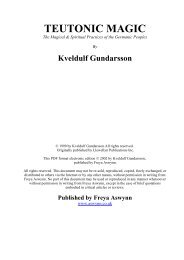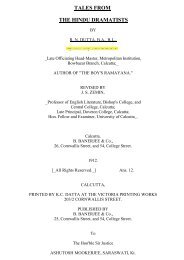Untitled - Awaken Video
Untitled - Awaken Video
Untitled - Awaken Video
You also want an ePaper? Increase the reach of your titles
YUMPU automatically turns print PDFs into web optimized ePapers that Google loves.
Chapter 2. Connections 54<br />
The spiritual philosophy of the early Germanic peoples, unlike that of Christianity,<br />
was not a route to salvation since they did not believe that anything to be<br />
saved from. One starts out in life as part of a family lineage and remains part of his<br />
lineage. The worldview and its proscription for action and responsibility was a way<br />
to access the power/ luck flowing with the Waters that fed the World Tree and a way<br />
for an individual to participate in the overall functioning of the Universe bringing<br />
meaning and value into a life well-lived. Our primary concern today is generally<br />
for personal comfort through life, but for the ancients, the ultimate desire was to<br />
fit comfortably into the scheme of things which, of course, brought with it a sense<br />
of personal comfort and well-being. Really, once one realizes that no individual life<br />
is separate from any other, the main desires in life, i.e. to be the best that any<br />
one can be, to live life to its fullest potential, and to go to the grave as a complete<br />
human being, are the same no matter the century or the place. Only the process of<br />
achieving these ends is different.<br />
Common 20 th century philosophy is something like “I must learn to love myself<br />
before I can love, care for and nurture others.” A quaint philosophy and rather<br />
commonly heard, but it is very ego-centric (almost pathologically so) and typical<br />
to this century. People already do love themselves above all others often to the<br />
point that they sometimes forget that others even exist (on freeways in the USA,<br />
in grocery store lines, at garage sales, etc.) and in their forgetfulness, they take<br />
the lives and conditions around them for granted sometimes actually causing great<br />
harm and destruction while engaging in their personal use of the world around<br />
them. Self-gratification has been the rule for ages. In fact, it was the very thing<br />
that brought the Roman Empire to ruin. Folks sate their desires for money, comfort,<br />
love, material goods, possessions, land and power without thought or concern for<br />
the effects that greed is wreaking. They search for royalty in their pasts to satisfy<br />
and pacify egos that have grown great at the expense of everything around them,<br />
but, in reality, these modern folks are the inheritors of Andvari’s gold. It is not that<br />
we do not “love ourselves” but that there is no value to our lives.<br />
For the ancients, the spiritual goals of the 20 th century would seem crude at<br />
best, for they believed in leading a life that was “worth” (from the same IE root as<br />
Urð; Wyrd) something, and that interacting with the Waters of Life was the means<br />
to a life of “worth.” The Hávamál or the ”Sayings of the High One” (one of the<br />
poems in the Elder or Poetic Edda) is often viewed as the Viking Code of Conduct<br />
as Lee Hollander’s introduction to her translation of it would indicate:<br />
“They (the poetic verses) stress especially the laws of hospitality, the<br />
rules of decent conduct, the value of circumspection in one’s dealings with<br />
men, the need for moderation in eating and drinking, the vanity of mere<br />
wealth compared with true merit–all in the spirit of Germanic Heathendom,
















